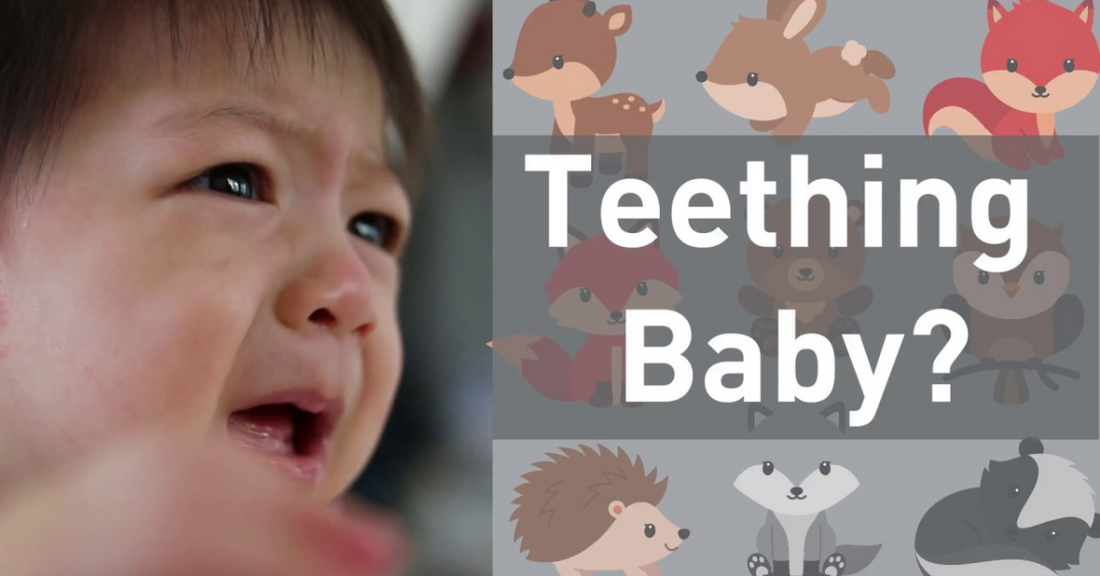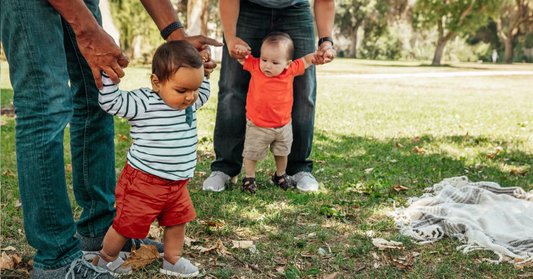您為什麼不應該將藥理學乾預用於嬰兒出牙,還有什麼安全的選擇?

藥物介入(如麻醉劑或止痛藥)雖然看似快速有效,但在緩解嬰兒出牙疼痛方面可能隱藏著重大的健康風險,包括過敏反應、毒性和致命的高鐵血紅蛋白血症。 FDA 明確建議避免使用含有苯佐卡因或利多卡因的產品。相反,父母可以選擇安全的非藥物方法,例如冷卻牙膠、輕柔的牙齦按摩或冷濕的毛巾,這些方法不僅有效,而且還能避免潛在的危險。
當您的寶寶開始長牙時,不安的夜晚和無休止的哭鬧會讓您感到迫切需要快速緩解。許多父母本能地考慮採用藥物幹預來緩解這種不適。然而,您可能沒有意識到使用藥物產品(例如局部麻醉劑或止痛劑)可能會對您的嬰兒造成嚴重的健康風險。幸運的是,有更安全、同樣有效的非藥物方法可以溫和地緩解寶寶出牙疼痛,而且沒有任何有害的副作用。
一般不建議對嬰兒出牙進行藥物幹預,例如局部麻醉劑或口服止痛藥,因為這會帶來嚴重的健康風險,包括過敏反應、毒性和高鐵血紅蛋白血症等嚴重情況。 FDA 明確建議 反對給嬰兒使用含苯佐卡因的產品,因為它們可能導致致命的血液疾病。相反,兒科醫生建議採用更安全的替代方法,例如冰牙膠、輕柔的牙齦按摩或使用乾淨的冷毛巾來安全地緩解嬰兒出牙時的不適。
現在我們已經快速介紹了避免使用藥物緩解出牙疼痛的主要原因,並簡要介紹了更安全的替代品,讓我們進一步詳細探討這些問題。了解藥物介入的具體風險,並準確學習如何實施更安全、更有效的替代方案,將幫助您自信地應對寶寶出牙的挑戰。
使用藥物治療嬰兒出牙有哪些風險?
當您的寶寶因出牙疼痛而苦惱時,想要立即得到解決是很自然的。不幸的是,常見的藥物介入看似有吸引力,但往往在其便利的背後隱藏著危險的健康風險。意識到這些風險對於保護嬰兒的健康至關重要。
藥理出牙產品有過敏反應、過量危險、高鐵血紅蛋白血症等嚴重疾病的風險。 苯佐卡因是一種常見的麻醉劑,由於其與一種罕見的、危及生命的血液疾病有關,因此受到 FDA 的特別勸阻。
由於有記錄顯示有嚴重反應甚至可能導致死亡的情況,FDA 明確建議家長避免使用黏稠利多卡因或苯佐卡因凝膠等外用出牙藥物。局部止痛藥的一個重大問題是其有效性有限;塗抹在嬰兒牙齦上的藥物通常會在幾分鐘內因唾液分泌而被沖走,即使能起到持久的緩解疼痛的作用,也只能起到很小的作用。
更令人擔憂的是,黏稠的利多卡因(一種常見的局部麻醉劑)即使攝取少量也會帶來嚴重風險。嬰幼兒如果服用過量黏稠利多卡因或意外吞服,可能會出現危及生命的不良事件,包括癲癇、嚴重腦部損傷和心臟問題。悲慘的是,有記錄顯示,嬰兒因服用劑量不正確或意外吞服而住院或死亡(見 關於非處方苯佐卡因凝膠和液體的藥品安全通報)。
2014 年,FDA 進行了全面的
有哪些安全有效的非藥物緩解出牙疼痛的方法?
當您的寶寶因出牙疼痛而痛苦時,您自然希望得到快速有效的緩解。不幸的是,外用止痛藥和塗抹於牙齦的藥物雖然看似方便,但卻會帶來嚴重的健康風險,而許多父母並沒有意識到這一點。清楚了解這些危險對於做出保護寶寶健康的明智決定至關重要。

安全有效的非藥物方法包括 嬰兒出牙環、冷毛巾、輕柔的牙齦按摩和分散注意力的技巧。這些方法可以自然緩解疼痛,而不會對嬰兒造成任何健康風險。
- 冷凍出牙環: 冷藏(但不冷凍)的出牙膠可提供溫和的冷卻壓力,安全地舒緩牙齦疼痛。確保出牙環專為嬰兒設計且不含 BPA。
- 冷毛巾: 將乾淨的濕毛巾短暫冷藏即可幫助舒緩牙齦發炎。讓您的嬰兒輕輕地咀嚼和吮吸這種柔軟、冰冷的織物可以立即帶來舒適感。
- 溫和的牙齦按摩: 使用乾淨的手指或專為嬰兒設計的橡膠指套,輕輕按摩寶寶的牙齦。這種輕微的壓力可以減輕牙齦不適並分散寶寶對疼痛的注意力。
- 分散注意力和安慰: 播放舒緩的音樂、輕輕搖晃或讓寶寶參與遊戲活動也有助於轉移他們對出牙疼痛的注意力。
兒科醫生強烈推薦這些方法,認為它們是藥物介入的安全、有效的替代方法。
出牙凝膠或 首頁 平和療法對嬰兒安全嗎?
許多父母選擇使用標示「天然」療法的出牙凝膠或順勢療法產品,希望能安全地緩解症狀。但這些產品對你的寶寶真的安全嗎?或者它們是否有隱憂?
FDA 和美國兒科學會 (AAP) 警告不要對嬰兒使用外用出牙凝膠和順勢療法藥物。許多此類產品監管不力,可能含有有害物質或劑量不一致。
儘管順勢療法出牙藥物和凝膠被宣傳為天然或安全,但它們已經受到衛生當局的嚴格審查。美國食品藥物管理局 (FDA) 已發出警告,指順勢療法出牙片含有顛茄等潛在有毒物質,可能導致癲癇、呼吸困難等不良反應,在極少數情況下甚至會導致嬰兒死亡。同樣,外用凝膠可能含有苯佐卡因或利多卡因,衛生當局明確不建議嬰兒使用這兩種物質。由於成分濃度不一致、潛在毒性以及缺乏療效證明,兒科醫生通常建議不要使用順勢療法或外用凝膠治療嬰兒出牙。
什麼時候該諮詢兒科醫生有關嬰兒出牙的問題?
出牙可能比較困難,但它通常是正常的發育階段。然而,有時寶寶的症狀可能預示著更嚴重的問題。您如何辨別兩者之間的差異?什麼時候該尋求專業的醫療建議?
如果您的寶寶出現高燒(高於 101°F 或 38.3°C)、嚴重腹瀉、長期拒絕進食或飲水、皮疹或感染跡像以及出牙症狀,請諮詢兒科醫生。
雖然輕微不適、流口水、煩躁和牙齦腫脹是常見的出牙症狀,但某些症狀並不典型,需要就醫:
- 高燒(101°F 或 38 度以上。3°C 的溫度並非由出牙引起,而是表示感染或其他疾病。
- 嚴重的腹瀉或嘔吐會很快導致脫水,尤其是在幼兒。
- 皮疹或行為的重大變化,例如極度嗜睡或無法安慰的哭鬧,都預示著出牙以外的潛在健康問題。
如果您發現任何這些症狀,或者您不確定寶寶的不適是否正常,請立即向兒科醫生尋求指導。
結論
總之,嬰兒出牙的藥物介入具有很大的風險,通常不受醫療專業人員推薦。更安全的替代方法,如冷藏牙膠、冷布、輕柔牙齦按摩和分散注意力的技術,可以有效緩解寶寶的不適,且不會產生有害的副作用。對於以天然或順勢療法藥物銷售的產品,請務必保持謹慎,如果寶寶的症狀看起來異常或嚴重,請立即諮詢兒科醫生。透過安全、建議的方法仔細處理出牙不適,您可以自信地支持寶寶的發育和健康。欲了解更多信息,請訪問: http://www.fda.gov/ForConsumers/ConsumerUpdates/ucm385817.htm
類似文章
- 局部出牙製劑引起的嚴重高鐵血紅蛋白血症。
外邦人 DA。
兒科急診護理。 1987年9月;3(3):176-8。 doi: 10.1097/00006565-198709000-00012。
PMID: 3671144 - 局部出牙準備引起的高鐵血紅蛋白血症:一例病例報告。
Balicer RD, Kitai E.
科學世界雜誌。 2004 年 7 月 15 日;4:517-20。 doi: 10.1100/tsw.2004.109。
PMID: 15311326 免費 PMC 文章。 - 苯佐卡因誘發的兒科高鐵血紅蛋白血症。
Lehr J、Masters A、Pollack B.
J Pediatr Nurs. 2012年10月;27(5):583-8。 doi:10.1016/j.pedn.2012.07.003。電子版 2012 年 7 月 20 日。
PMID: 22819745反饋 。 - 局部使用 7.5% 苯佐卡因(嬰兒奧拉吉)治療幼兒出牙疼痛導致嚴重的高鐵血紅蛋白血症。
Bong CL、Hilliard J、Seefelder C.
臨床兒科(費城)。 2009年3月;48(2):209-11。 doi: 10.1177/0009922808324491。電子版 2008 年 10 月 3 日。
PMID: 18836057 - 出牙凝膠對我們的孩子來說是否安全,甚至有必要嗎?一個
反饋 局部利多卡因出牙凝膠的安全性、有效性和使用。
Teoh L,Moses GM。
J Paediatr 兒童健康。 2020年4月;56(4):502-505。 doi: 10.1111/jpc.14769。 Epub 2020 年 1 月 3 日。
PMID: 31898380反饋 。







0評論